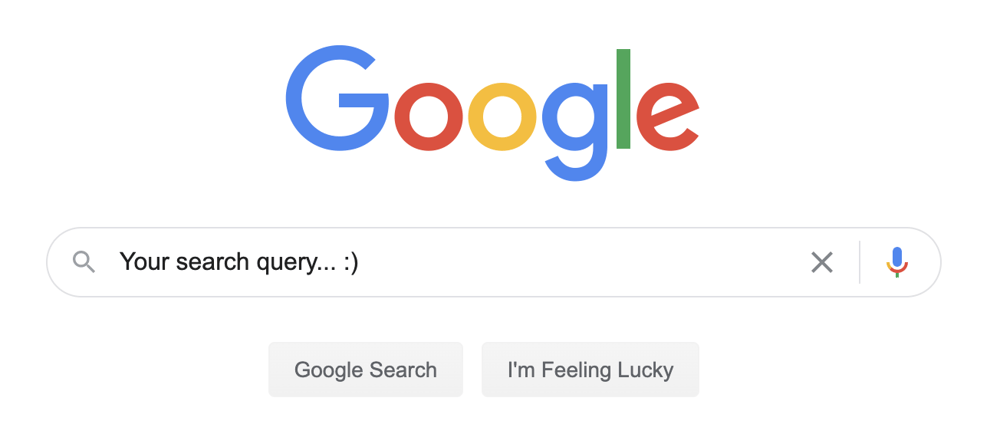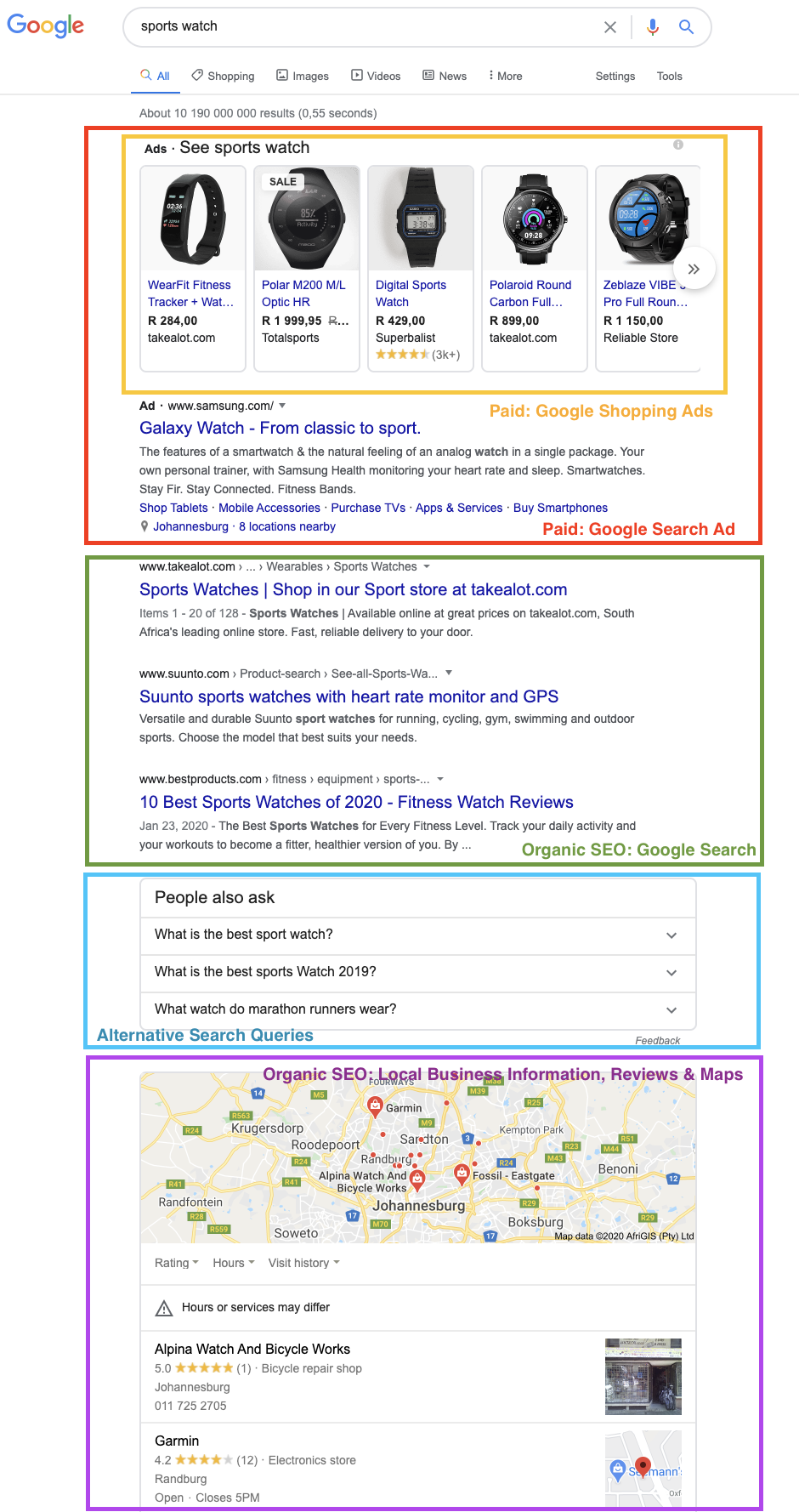SEO is a sustainable way to market your website. Using SEO to create a regular audience and generate consistent leads is essential for a website's success.
Rather than calling this blog 'What is SEO?', I thought it would be more practical to frame the question as 'Why is SEO important for your website?'
If we read through some high level SEO theory in the practical application of why you need SEO for your website - the concepts are easier to understand and easier for me to write! I hope you find this blog useful.
Why SEO is so important?
- More than 70% of B2B researchers start their buying process with a generic search. (SearchEngine Journal)
- 81% of shoppers conduct online research before making big purchases. (Invoca)
- 93% of online experiences begin with a search engine. (Techjury).
The way we buy things has changed dramatically over the last few years, and even more so with the recent COVID pandemic changing our normal patterns of life and how we go about shopping.
Imagine that just ten years ago if you wanted a new TV for your home or a new machine for your business you generally bought it from your local store or from a salesperson who cold called you.
This has changed entirely. Here's how:
Example: B2C (Business to Consumer)
In the digital age, you now research the best TV in your budget range. You can then order it from the online retailer with the best price. If you want the TV ASAP, you go to the nearest store and tell them to match the price, or you can just order it online and have it delivered straight to your address.
Example: B2B (Business to Business)
As for the machine for your business - let's say a new industrial oven for your restaurant's kitchen is what you need. You research the best commercial oven providers (and brands) in your region and only ask two or three of them to come to see you. Long gone are the days of cold calling reps opening up conversations to find out if their products are any good.

A business' website now does the preliminary part of the sales process. After the research phase, the prospect calls the potential suppliers having done all the initial evaluations and sales process upfront.
Good SEO gets your foot in the door at the start of the evaluation process. You can't afford to not be there when your client is looking for your products and services. Research has shown that potential buyers are most likely to choose from one of the top three results in a Google search — SEO is what gets your website there!
What is a Search Engine?
In the Western world, the largest search engines are Google, YouTube, and Bing. Google is by far the largest and most relevant for boosting the traffic to your website as it's the most frequently used site.
Most people don't realise that Google is only an index of all the pages on the internet. What this means is that when you type your query into Google, it actually searches its own index, and not the internet. That's why Google is so fast to give you your search results. Once you click on the search result, Google redirects you to the website.
Website pages that are not listed on Google and other search engines are part of the Dark Web, but that's for another blog post.
Google's rise as the largest and most used search engine is because they are the best at providing you with the most relevant answers to your questions.
SEO's goal is for your website to be one of the answers Google provides at the top of its list. Enter the art of SEO.
The Search Engine Results Page
After you've typed in your search query and clicked enter, you will be redirected to the Search Engine Results Page or SERP. When you are doing SEO, it's essential to understand what the page is made up of, because you can target different areas of the SERP.

Although simplified, the image below shows what a SERP looks like. The red and yellow sections at the top are paid for using the Google Ads platform. The rest of the results are to do with organic ranking and for the maps section a combination of organic ranking and geographic location.
We call the process of ranking and marketing a website for organic results - SEO (Search Engine Optimisation). The green and purple sections are where your website will appear if you are doing SEO. As a rule of thumb, the higher up you are on the page the better your SEO is.
We call the process of ranking and marketing a website using paid ads - SEM (Search Engine Marketing). The red and yellow regions below are where you will appear if you are doing SEM. Getting higher up on the page for paid ads is a combination of your website's relevance to the users' search query and how much you are prepared to pay for the top spot.

How do you do SEO?
SEO is a combination of many skills, but we can place them into three silos:
- On-page SEO
- Off-page SEO
- Content
Of the three, off-page SEO is the hardest to get right because it is a combination of great content and interpersonal skills. Both can be very challenging for most people! I'll elaborate below.
1. On-page SEO
Moz defines on-page SEO as the practice of optimising elements on a website (as opposed to links elsewhere on the internet and other external signals collectively known as "off-page SEO") to improve search engine ranking and visibility.
The following elements are looked at when doing on-page SEO:
- Title Tag
- Meta Description
- Image Alt Text
- Internal Linking
- Duplicate Content
- Page Speed
- Conversion Rate Optimisation
- Domains
- URL's
- Redirects
2. Off-page SEO
Moz defines off-page SEO as actions taken outside of your own website to impact your rankings within search engine results pages (SERPs). Optimising for off-site ranking factors involves improving search engine and user perception of a site's popularity, relevance, trustworthiness, and authority.
The following elements are looked at when doing off-page SEO:
- Backlinks
- Social Media Marketing
- Guest Blogging
- Linked and unlinked brand mentions
- Influencer Marketing
But by far, the most important element is backlinks. Backlinks take on many different forms but the three most relevant are:
1. Natural links: Someone links to a page on your site because they think it's an appropriate resource.
2. Manually built links: Link-building activities can include things like getting customers to link to your site or asking influencers to share your content.
3. Self-created links: Adding an online directory listing, forum post, or blog comment with a link back to your website. (PS. These can get dodgy so use them carefully.)
3. Content
Google has become incredibly efficient at deciphering what high-quality original content is, and what's just fluff. Unfortunately, most content on the web is just fluff. And that's why it does not rank.
Keywords and keyword research are at the heart of great content that performs well with SEO. Every region has different keywords and phrases that searchers use to describe what they are searching for. If you want your SEO to rank, you need to find out what those keywords and phrases are.
The next step is to create great content for that keyword/term that is better than the current ranking websites.
This is easier said than done, as great content takes a long time to write. In addition, getting a copywriter to write it is not always the best solution because you know your business best. Copywriters often just regurgitate existing content on the web. It's not really plagiarised, but it's not really original either.
Google knows original content from regurgitated content. Their AI is getting incredibly smart. Write original content for SEO. Get subject matter experts in your business to write it. Get a copywriter to clean it up.
Benefits of performing SEO on your website
So now that you know what SEO is, do you really need it? Can't you just do SEM (Paid ads)?
Below are some of the benefits of performing Search Engine Optimisation on your website and keeping up consistent SEO maintenance.
1. SEO is low cost when compared to paid ads
Organic SEO is relatively low cost. It only costs a regular investment of time in great content and a healthy dose of patience on your part. When you find yourself on the top of organic search engine results, you can sit back and watch the traffic come in. This is without the need for a monthly budget on PPC (pay-per-click) advertising like Google Adwords.
The problem with paid ads or PPC (pay-per-click) advertising like Google Ads is that as soon as your budget runs out, your traffic stops. SEO is essentially the gift that keeps on giving.
As your online website content matures, it is indexed by search engines like Google, and you create backlinks to your website pages. People also link to your content and your website gains authority on the specific theme or focus topic.
The net effect of this is more organic website traffic. This is brought through better keyword rankings for your website.
2. SEO builds higher brand credibility & authority
In reality, many people trust the first search result they see for a keyword or search term when they punch it into search engines like Google. They see companies that rank well on search engines like Google as reputable. So by doing SEO your website becomes a brand that can be trusted.
Google filters web content based on strict content guidelines enhanced by regular algorithm updates. The algorithm updates define when and where the search engine shows a top-ranking site. This means users receive the most relevant content when they conduct searches. This is why users trust Google’s top-ranking results. And why these sites demonstrate much higher credibility than lower ranking sites.
3. Your website needs to be on the first page of Google organically
Most people never scroll past the first page of search engines. When last did you go to page 2 of the search results? This means that if your website is not ranking on the first page of Google, or other search engines, you are missing out on potential clicks and overall organic brand awareness.
By getting to the first page of search engine results, you are guaranteeing yourself a continuous stream of organic website visitors.
By moving to the top of the first page, you start to establish your brand as a leader in your field.
4. Access to data allows you to leverage content for organic lead generation at no cost
By looking at your website analytics, you can see what products and services visitors are looking at on your website. You can also see the search terms and queries they are using to find your website via search engines. This exercise will show you where the gaps in your content are.
All websites have gaps in their content, and if you can provide that content to your potential clients before your competitors, the leads will come to you.
This type of customer data is very valuable and is easy to access with tools like Google Analytics and Google Search Console. Using this data to your advantage is so beneficial in the long term for your website.
5. Good results require minimal upkeep when it comes to SEO and long-term benefits
When compared to PPC paid advertising like Google Adwords, the effects of SEO are long-lasting and do not suddenly stop paying off when the budget runs out.
Unless you use what we call Black-hat SEO practices, where you use frowned-upon SEO techniques, your SEO results will be long-lasting. Black-hat techniques could wipe your website off Google at the next Google algorithm update. So keeping up-to-date with the latest information from Google and SEO experts and professionals is important.
There is, of course, some upkeep when it comes to maintaining SEO and keeping top rankings on search engine results. Content needs to be updated and technical website and SEO fixes need to be done periodically.
However, it will be difficult for competitors to beat you when you keep consistently practising good SEO.
6. Your competitors may already be committed to SEO and understand its benefits.
Now that you have realised the benefits of SEO and that it is extremely valuable, you need to know that some of your competitors are already on the SEO train and are taking full advantage of it to their benefit.
So, if your competitors are ranking on Google, you need to play catch-up and be certain that you are optimising website content for the correct keywords. If they aren't taking advantage of SEO, capitalise on their lack of focus and use the time to move well out of their reach online.
Focus on long-tail keyword opportunities that attract modest volumes of website traffic and work your way from there. For example, target 'Best legal consulting services in Johannesburg', rather than 'legal consulting services'.
Keep up with the trends
Google is constantly updating its algorithm to improve the way that content shows up in its SERPs. What this means is that the content that might have ranked at the top of the SERPs five years ago, might not even make it onto the first page today, and that's what makes SEO so tricky.
It's very similar to social media in that sense — always evolving with new tricks to learn. So, it's as easy as learning how to do SEO, you need to make sure that you keep up with the trends, and when Google announces an update, make sure to get into the update notes and re-teach yourself how to get your website to rank well!
Just as an example, Google made 4500 updates to their search function in 2020 alone. The latest update is the one that has thrown off tons of website owners and it completely changed the game in terms of how you need to write your content and how you get it to rank higher than your competitors.
Final thoughts on SEO
Taking all of the above information into account, if you are not actively optimising your website both on-page and off-page to work well with search engines, then you are limiting the performance potential of your website.
Your business could benefit immensely from following through with some basic organic SEO. Although organic reach on digital platforms such as social and search may be in decline, the benefits above show that SEO has some great benefits in the long run for your business.
61% of marketers say improving SEO and growing their organic presence is their top inbound marketing priority. (HubSpot). Add to this that 57% of B2B marketers stated that SEO generates more leads than any other marketing initiative. SEO should still very much be a concerning priority for your website.




